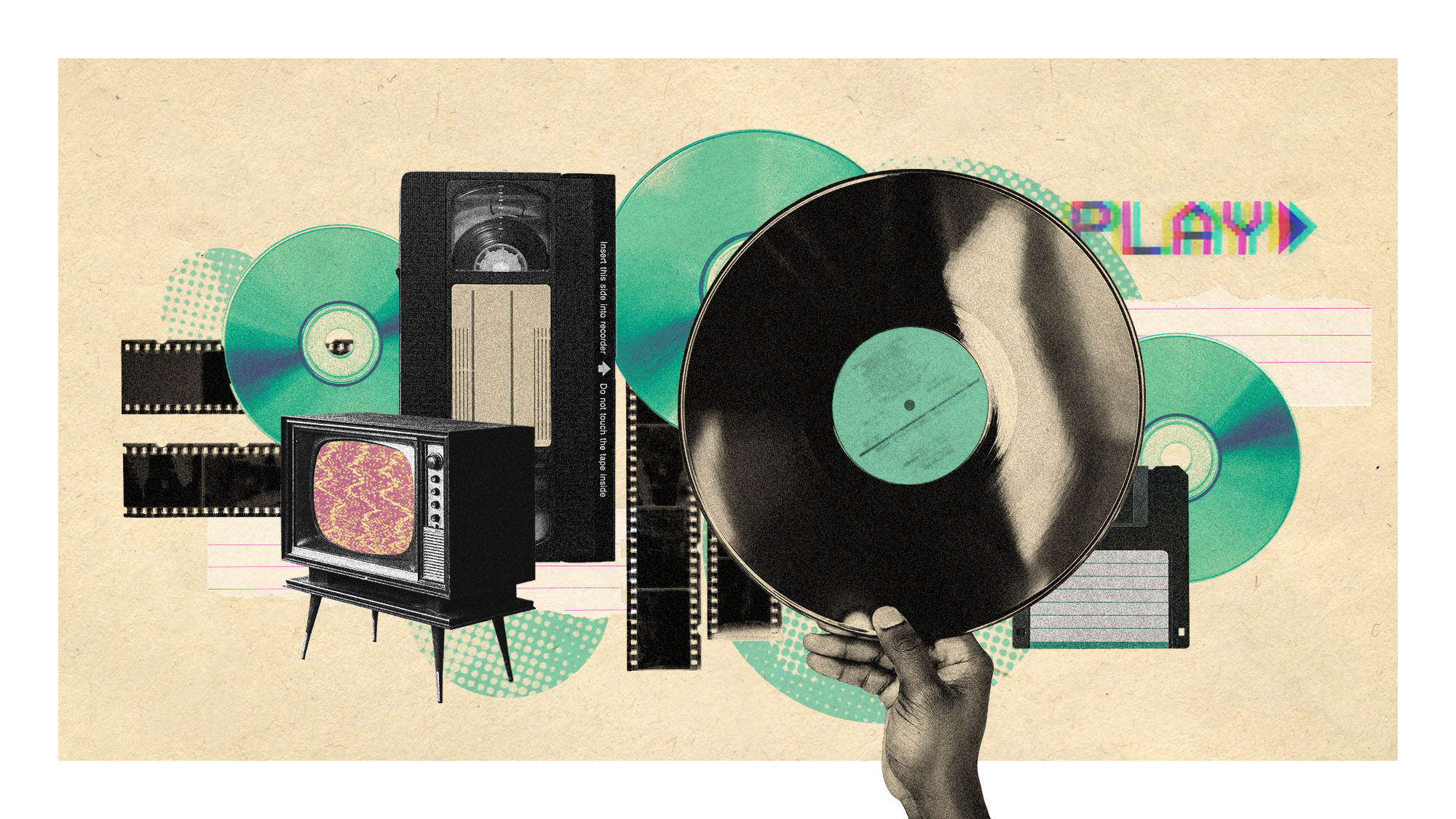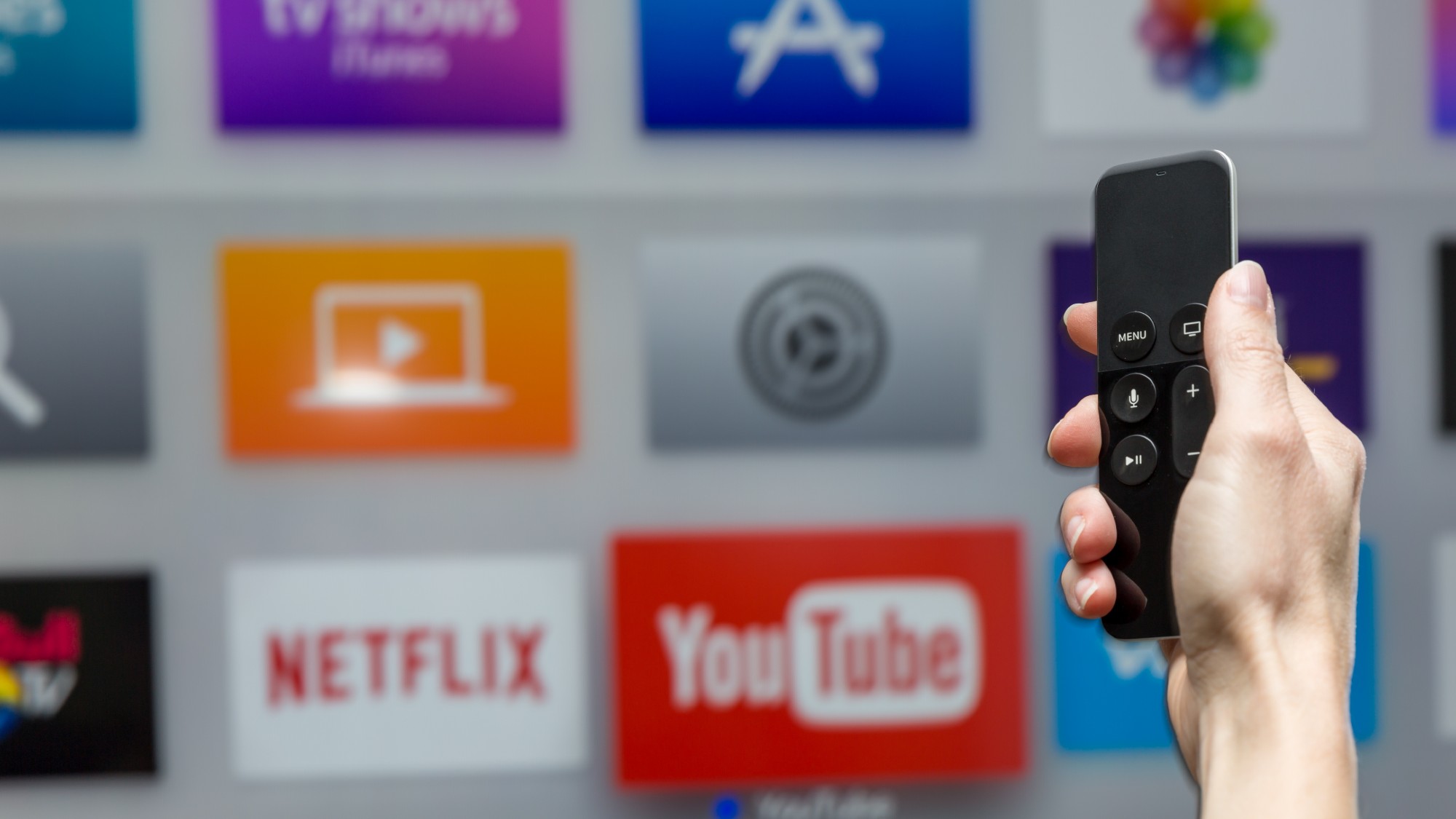Physical media is having a moment
While streaming dominates the way we watch, listen and play, a growing number of people are finding pleasure — and treasures — in media they can hold


A free daily email with the biggest news stories of the day – and the best features from TheWeek.com
You are now subscribed
Your newsletter sign-up was successful
For as long as humans have made stories, songs, and other forms of self-expression, we have also endeavored to find new and theoretically better ways to share those efforts with others. Cave paintings, illuminated manuscripts, wax cylinders, vinyl, laserdisc and so on — each new medium brings its own unique set of assets and challenges. These not only shape how we consume the media in question, but also help define the role of art in our lives.
In our current era of digital streaming, finding a movie to watch, an album to listen to or a game to play can be an exercise in sofa-based instant gratification. But a growing number of people are rejecting what they see as ephemeral app-based media. Instead, users have begun returning to the assurances of physical media that exist outside the whims of streaming's powers-that-be. Turned off by the churn of licensing agreements, streaming rights, and other structural forces that undercut any sense of digital ownership and permanence, consumers are once again embracing DVDs, CDs and other forms of tangible media. Once purchased, these items belong to them and them alone.
Is this return to once-abandoned mediums simply an exercise in nostalgia, or are the apparent flaws in the streaming ecosystem truly driving people back into the arms of tape decks and video game cartridges? Whatever the reason, physical media is undeniably having an unexpected moment.
The Week
Escape your echo chamber. Get the facts behind the news, plus analysis from multiple perspectives.

Sign up for The Week's Free Newsletters
From our morning news briefing to a weekly Good News Newsletter, get the best of The Week delivered directly to your inbox.
From our morning news briefing to a weekly Good News Newsletter, get the best of The Week delivered directly to your inbox.
"As volatile as it gets"
The "great pitch for streaming" at its onset was the notion of a convenient, one-stop shop for consumers to find their favorite media. However, rising subscription prices and the introduction of ads have made the entire industry "even more hostile" to users, IGN said. Moreover, if a streaming service opts to remove its original content without offering a physical alternative, then that show or movie "pretty much ceases to exist." Physical copies, then, are the "only way to ensure you can always watch them."
Streaming service libraries are as "volatile as it gets," agreed CNN, which pointed out that "digital purchases aren't actually safe either." Meanwhile, the "limits of modern home internet" means 4K Blu-ray quality will always be higher. Perhaps most importantly, some films and shows "just can't be found on streaming services or even as digital purchase or rental." Owning physical media is "valid and in some cases necessary" not just for personal enjoyment, but for the "preservation of cinema and TV" at large. Buoyed by praise from high-profile directors like Christopher Nolan and Wes Anderson, 4K Blu-rays in particular have become a major factor in the pivot back to physical media, with sales up "almost 6% in the third quarter of 2023 compared to 2022, and "up 20% year-over-year" at the end of 2022, The Wrap said, citing numbers from Digital Entertainment Group. It's the one area of physical media that's "actually growing" as the market goes through a "period of intense transformation."
Given the sheer convenience of streaming services, it is unlikely physical media will "become the norm for the general public," one movie critic said to tech site Livewire last month. But it could "regain popularity, especially among collectors and enthusiasts."
"More important than ever"
The appeal of physical media to niche groups of consumers is already apparent among anime fans. For example, those who have helped Justin Sevakis, founder and CEO of postproduction company MediaOCD, "find success by playing specifically to the small, passionate communities," said The Verge . While a "good hit in the niche Blu-ray space will move something like 5,000" discs, Sevakis told the outlet, the fact that they are not "huge numbers" does not lesson the fervor of committed fans who get "excited over the idea of physically owning media like this." The ephemeral nature of streaming means the work that Sevakis and others like him do "feels more important than ever."
A free daily email with the biggest news stories of the day – and the best features from TheWeek.com
It's not just film and television. While video game downloads have become a major avenue of sales worldwide, "it seems Japan still absolutely loves physical games," Kantan Games’ Serkan Toto told The Verge, citing Japan’s Computer Entertainment Supplier’s Association estimates. These showed that "65 percent of PlayStation 5 games" were physical purchases in Japan in 2022, compared to the "70 percent of full PS4 and PS5 game sales in 2022" sold globally which were digital.
Rafi Schwartz has worked as a politics writer at The Week since 2022, where he covers elections, Congress and the White House. He was previously a contributing writer with Mic focusing largely on politics, a senior writer with Splinter News, a staff writer for Fusion's news lab, and the managing editor of Heeb Magazine, a Jewish life and culture publication. Rafi's work has appeared in Rolling Stone, GOOD and The Forward, among others.
-
 Political cartoons for February 9
Political cartoons for February 9Cartoons Monday's political cartoons include 100% of the 1%, vanishing jobs, and Trump in the Twilight Zone
-
 Who is Starmer without McSweeney?
Who is Starmer without McSweeney?Today’s Big Question Now he has lost his ‘punch bag’ for Labour’s recent failings, the prime minister is in ‘full-blown survival mode’
-
 Hotel Sacher Wien: Vienna’s grandest hotel is fit for royalty
Hotel Sacher Wien: Vienna’s grandest hotel is fit for royaltyThe Week Recommends The five-star birthplace of the famous Sachertorte chocolate cake is celebrating its 150th anniversary
-
 The Washington Post is reshaping its newsroom by laying off hundreds
The Washington Post is reshaping its newsroom by laying off hundredsIn the Spotlight More than 300 journalists were reportedly let go
-
 Why is the Pentagon taking over the military’s independent newspaper?
Why is the Pentagon taking over the military’s independent newspaper?Today’s Big Question Stars and Stripes is published by the Defense Department but is editorially independent
-
 ‘Netflix needs to not just swallow HBO but also emulate it’
‘Netflix needs to not just swallow HBO but also emulate it’instant opinion Opinion, comment and editorials of the day
-
 Paramount fights Netflix for Warner as Trump hovers
Paramount fights Netflix for Warner as Trump hoversSpeed Read Paramount Skydance is seeking to undo Netflix’s purchase of Warner Bros. Discovery
-
 Rothermere’s Telegraph takeover: ‘a right-leaning media powerhouse’
Rothermere’s Telegraph takeover: ‘a right-leaning media powerhouse’Talking Point Deal gives Daily Mail and General Trust more than 50% of circulation in the UK newspaper market
-
 Streaming: Get ready for more blackouts
Streaming: Get ready for more blackoutsfeature Disney finally struck a deal to get its television channels back on Google’s YouTube TV streaming service
-
 Paramount, Comcast, Netflix bid for WBD
Paramount, Comcast, Netflix bid for WBDSpeed Read The outcome of this bidding war ‘could alter the trajectory of the entertainment business’
-
 How Bari Weiss could change CBS News
How Bari Weiss could change CBS NewsTalking Points Is the network trying to ‘appease’ the president?
